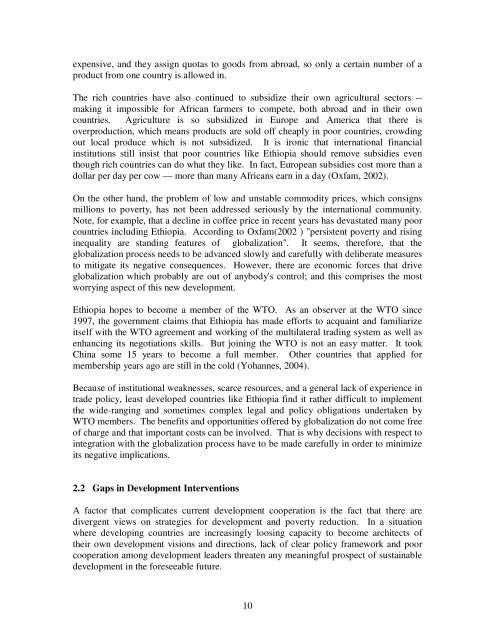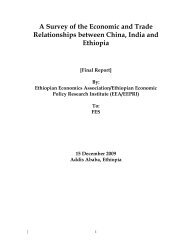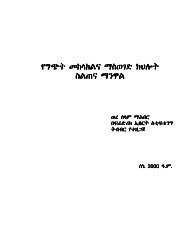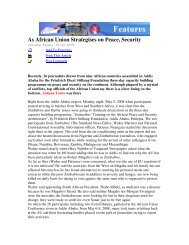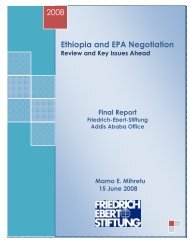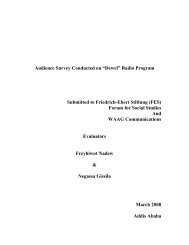external influence in the making of development ... - FES Ethiopia
external influence in the making of development ... - FES Ethiopia
external influence in the making of development ... - FES Ethiopia
Create successful ePaper yourself
Turn your PDF publications into a flip-book with our unique Google optimized e-Paper software.
expensive, and <strong>the</strong>y assign quotas to goods from abroad, so only a certa<strong>in</strong> number <strong>of</strong> a<br />
product from one country is allowed <strong>in</strong>.<br />
The rich countries have also cont<strong>in</strong>ued to subsidize <strong>the</strong>ir own agricultural sectors --<br />
mak<strong>in</strong>g it impossible for African farmers to compete, both abroad and <strong>in</strong> <strong>the</strong>ir own<br />
countries. Agriculture is so subsidized <strong>in</strong> Europe and America that <strong>the</strong>re is<br />
overproduction, which means products are sold <strong>of</strong>f cheaply <strong>in</strong> poor countries, crowd<strong>in</strong>g<br />
out local produce which is not subsidized. It is ironic that <strong>in</strong>ternational f<strong>in</strong>ancial<br />
<strong>in</strong>stitutions still <strong>in</strong>sist that poor countries like <strong>Ethiopia</strong> should remove subsidies even<br />
though rich countries can do what <strong>the</strong>y like. In fact, European subsidies cost more than a<br />
dollar per day per cow — more than many Africans earn <strong>in</strong> a day (Oxfam, 2002).<br />
On <strong>the</strong> o<strong>the</strong>r hand, <strong>the</strong> problem <strong>of</strong> low and unstable commodity prices, which consigns<br />
millions to poverty, has not been addressed seriously by <strong>the</strong> <strong>in</strong>ternational community.<br />
Note, for example, that a decl<strong>in</strong>e <strong>in</strong> c<strong>of</strong>fee price <strong>in</strong> recent years has devastated many poor<br />
countries <strong>in</strong>clud<strong>in</strong>g <strong>Ethiopia</strong>. Accord<strong>in</strong>g to Oxfam(2002 ) "persistent poverty and ris<strong>in</strong>g<br />
<strong>in</strong>equality are stand<strong>in</strong>g features <strong>of</strong> globalization". It seems, <strong>the</strong>refore, that <strong>the</strong><br />
globalization process needs to be advanced slowly and carefully with deliberate measures<br />
to mitigate its negative consequences. However, <strong>the</strong>re are economic forces that drive<br />
globalization which probably are out <strong>of</strong> anybody's control; and this comprises <strong>the</strong> most<br />
worry<strong>in</strong>g aspect <strong>of</strong> this new <strong>development</strong>.<br />
<strong>Ethiopia</strong> hopes to become a member <strong>of</strong> <strong>the</strong> WTO. As an observer at <strong>the</strong> WTO s<strong>in</strong>ce<br />
1997, <strong>the</strong> government claims that <strong>Ethiopia</strong> has made efforts to acqua<strong>in</strong>t and familiarize<br />
itself with <strong>the</strong> WTO agreement and work<strong>in</strong>g <strong>of</strong> <strong>the</strong> multilateral trad<strong>in</strong>g system as well as<br />
enhanc<strong>in</strong>g its negotiations skills. But jo<strong>in</strong><strong>in</strong>g <strong>the</strong> WTO is not an easy matter. It took<br />
Ch<strong>in</strong>a some 15 years to become a full member. O<strong>the</strong>r countries that applied for<br />
membership years ago are still <strong>in</strong> <strong>the</strong> cold (Yohannes, 2004).<br />
Because <strong>of</strong> <strong>in</strong>stitutional weaknesses, scarce resources, and a general lack <strong>of</strong> experience <strong>in</strong><br />
trade policy, least developed countries like <strong>Ethiopia</strong> f<strong>in</strong>d it ra<strong>the</strong>r difficult to implement<br />
<strong>the</strong> wide-rang<strong>in</strong>g and sometimes complex legal and policy obligations undertaken by<br />
WTO members. The benefits and opportunities <strong>of</strong>fered by globalization do not come free<br />
<strong>of</strong> charge and that important costs can be <strong>in</strong>volved. That is why decisions with respect to<br />
<strong>in</strong>tegration with <strong>the</strong> globalization process have to be made carefully <strong>in</strong> order to m<strong>in</strong>imize<br />
its negative implications.<br />
2.2 Gaps <strong>in</strong> Development Interventions<br />
A factor that complicates current <strong>development</strong> cooperation is <strong>the</strong> fact that <strong>the</strong>re are<br />
divergent views on strategies for <strong>development</strong> and poverty reduction. In a situation<br />
where develop<strong>in</strong>g countries are <strong>in</strong>creas<strong>in</strong>gly loos<strong>in</strong>g capacity to become architects <strong>of</strong><br />
<strong>the</strong>ir own <strong>development</strong> visions and directions, lack <strong>of</strong> clear policy framework and poor<br />
cooperation among <strong>development</strong> leaders threaten any mean<strong>in</strong>gful prospect <strong>of</strong> susta<strong>in</strong>able<br />
<strong>development</strong> <strong>in</strong> <strong>the</strong> foreseeable future.<br />
10


